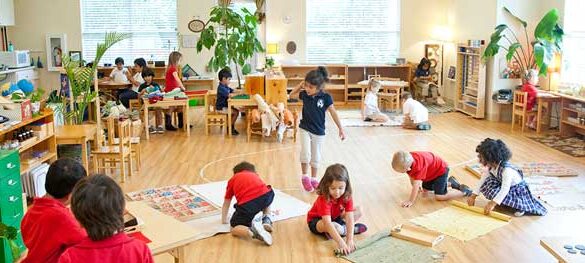Understanding the Core Principles of Montessori Education
The Montessori Method, developed by Dr. Maria Montessori in the early 20th century, is grounded in a profound respect for children and their innate ability to direct their own learning. Central to this approach is the belief that education is not merely the transmission of knowledge but rather a holistic process that nurtures the cognitive, emotional, social, and physical development of the child. The core principles of Montessori education include the concepts of independence, observation, sensory learning, and mixed-age classrooms.
By fostering independence, children learn to take responsibility for their education and make choices about their learning paths. Observation plays a critical role in Montessori classrooms, allowing educators to tailor activities to each child’s individual needs while ensuring a supportive learning environment. This approach encourages sensory learning, where children engage with materials that activate their senses, promoting deeper understanding.
Finally, the structure of mixed-age classrooms mimics real-world social interactions, allowing older children to mentor younger ones, reinforcing their own learning and fostering a sense of community.
The Role of the Educator: Guide vs. Instructor
Within the Montessori framework, the role of the educator is fundamentally transformed from that of a traditional instructor to a guide or facilitator. Rather than disseminating information, Montessori educators observe their students, assess their interests and developmental stages, and provide tailored guidance to support individual learning journeys.
This process requires deep knowledge of child development and a commitment to fostering a nurturing environment where children feel valued and motivated. Educators curate an environment rich with materials and opportunities for exploration, promoting autonomy and encouraging children to engage in self-directed learning.
Additionally, Montessori educators encourage critical thinking and problem-solving skills, fostering an intrinsic love of learning that goes infinitely beyond rote memorization. This model cultivates a partnership between educator and student, where both are engaged in the process of learning—facilitating not only academic growth but also emotional and social development.
Child-Centered Learning: Why It Matters
At the heart of the Montessori approach lies child-centered learning, emphasizing that each child’s unique interests, abilities, and cultural background should inform their education. This learner-driven paradigm contrasts sharply with conventional education, which often prioritizes a one-size-fits-all model. In a Montessori classroom, children are encouraged to engage with materials and subject matter that resonate with them personally, creating a meaningful and relevant learning experience. This approach nurtures a sense of agency; children discover that their choices hold power, cultivating confidence and self-esteem.
Moreover, child-centered learning respects the natural developmental timelines of each child, allowing for intrinsic motivation to guide exploration and learning. Research supports that such personalized educational experiences contribute to higher levels of engagement and retention of knowledge, highlighting the critical importance of adapting the educational process to each child’s needs. Ultimately, child-centered learning in the Montessori method equips children with the skills they need to navigate an ever-changing world, culminating in empowered and resilient learners.
Creating the Perfect Montessori Environment: More Than Just a Classroom
The Importance of Prepared Spaces for Learning
A defining characteristic of Montessori education is the concept of a “prepared environment.” This philosophy asserts that the physical space must be meticulously arranged to facilitate freedom of choice, movement, and discovery, allowing children to thrive. A well-prepared environment incorporates elements of order, accessibility, and beauty. Each material is purposefully placed within reach, inviting exploration and engagement. The layout of the classroom contributes to a smooth flow of activity, enabling children to move fluidly between areas of interest. Importantly, the environment must be designed to minimize distractions, providing children with a serene and supportive atmosphere conducive to learning. Crafts, sensory play, practical life exercises, and academic materials should all exist harmoniously, allowing for comprehensive development. Children easily make connections across disciplines when the environment supports interrelatedness, ensuring they view learning as a unified whole rather than disparate subjects. A well-prepared environment also fosters respect for the space, with children caring for materials and developing an appreciation for order and aesthetics. This principle extends to outdoor environments as well, integrating nature as an integral part of the learning experience.
Materials Matter: Choosing the Right Montessori Tools
In the Montessori method, the selection of materials is paramount, as it directly influences the quality of the learning experience. Montessori materials are designed to be both aesthetically pleasing and educational, embodying the principles of sensory engagement and hands-on learning. Each tool is purposefully crafted to introduce specific concepts, promote skill-building, and foster independence. For example, materials like the Pink Tower and the Golden Beads are designed to teach concepts of size, dimensions, and mathematical principles while engaging children’s senses. The progression of materials also plays a crucial role, as they introduce complexity gradually, aligning with children’s developmental stages and abilities. Montessori educators emphasize the importance of natural, sustainable materials, as they encourage tactile exploration and foster a connection to the real world. By utilizing well-chosen materials, children are not just passive recipients of information; they become active participants in their learning journeys, experimenting, problem-solving, and forging connections with the various elements of their education.
Natural Elements: How Outdoors Enhance Montessori Experiences
The inclusion of natural elements in a Montessori education enhances the learning experience significantly, recognizing the profound benefits that nature offers for cognitive and emotional development. Montessori emphasizes the importance of outdoor learning as children engage with their environment, connecting academic concepts with the real world. Outdoor classrooms provide opportunities for exploration, allowing children to delve into natural sciences, develop sensory awareness, and cultivate an appreciation for biodiversity. Activities such as gardening, nature walks, and outdoor experiments invite children to observe and inquire about their surroundings, reinforcing lessons learned in the classroom.
Furthermore, outdoor experiences ignite a sense of curiosity and wonder, fostering emotional resilience and social skills as children collaborate on projects or navigate challenges in a natural setting. Nature-based learning also helps mitigate the increasing levels of stress and anxiety in children, promoting overall well-being. In embracing the natural world, Montessori education underscores the importance of holistic development, ensuring children grow not only academically but also socially, emotionally, and physically.
Montessori Across the Ages: Adapting to Every Stage of Development
Infants and Toddlers: Laying the Groundwork for Independence
The early years of a child’s life provide a critical opportunity for fostering independence and establishing a strong foundation for future learning. In Montessori education, infants and toddlers engage in experiences designed to promote self-sufficiency while respecting their developmental needs. The environment is tailored to encourage movement and exploration, with materials and activities intentionally placed to invite interaction. Practical life exercises, such as pouring, sorting, and dressing, empower young children to develop crucial fine motor skills while cultivating a sense of accomplishment.
Furthermore, these activities foster problem-solving skills and enhance sensory awareness, enabling infants and toddlers to make sense of their world. Montessori educators recognize the importance of routine, providing a structure that offers security while allowing flexibility. Through respectful guidance and observation, caregivers facilitate choice, enabling children to explore their interests and learn at their own pace. This foundational stage of development lays the groundwork for future learning, instilling confidence, curiosity, and a love for exploration that extends well beyond early childhood.
Preschool Years: Fostering Curiosity and Exploration
As children transition into their preschool years, the Montessori approach pivots to further nurture their innate curiosity and desire for exploration. At this stage, the curriculum becomes increasingly rich and diverse, encompassing language, mathematics, science, music, and art. Montessori classrooms are designed with materials that stimulate engagement and inquiry, encouraging children to experiment and investigate. For instance, language development is supported through interactive storytelling, phonetic activities, and vocabulary-rich materials, all designed to cultivate a love for reading and communication.
Additionally, the inclusion of culturally rich materials and experiences exposes children to global perspectives, enriching their understanding of the world. Preschool-age children thrive in collaborative environments, where they can share ideas, work together on projects, and learn from one another. This peer interaction fosters social development and critical thinking skills, as children engage in constructive dialogue and collective problem-solving. Through this child-centered approach, Montessori education cultivates a profound sense of agency and autonomy, empowering preschoolers to navigate their learning experiences and embrace a world of possibilities.
Elementary and Beyond: Cultivating Lifelong Learners
In the elementary years and beyond, Montessori education continues to foster holistic development while adapting to the growing needs and interests of older children. The curriculum expands to encompass more complex concepts across various disciplines, encouraging children to make connections and appreciate the interconnectedness of knowledge. The focus shifts to project-based learning, wherein children engage in deep inquiries that require research, collaboration, and critical thinking.
Real-world connections are emphasized, as students explore topics through hands-on experiences, field trips, and community service projects. Montessori educators serve as facilitators, guiding children in developing their learning goals and encouraging them to take ownership of their education. To cultivate a growth mindset, they focus on intrinsic motivation, resilience, and an appreciation for persistence and effort while embracing challenges.
The ultimate goal is to develop not only academically proficient individuals but also socially responsible and ethically aware citizens equipped to contribute positively to society. Through the Montessori method, children’s learning journeys extend far beyond the classroom, instilling a passion for lifelong learning that transcends traditional measures of educational success.
Expanding the Montessori Experience: Beyond the Classroom Walls
Incorporating Montessori Principles at Home
The principles of Montessori education are not confined within classroom walls; rather, they can be seamlessly integrated into the home environment to enrich family dynamics and promote child development. Parents and caregivers can adopt strategies that align with the Montessori philosophy, creating an enriching atmosphere that fosters independence, responsibility, and joy in learning.
A well-prepared home environment includes child-sized furniture, accessible shelves filled with age-appropriate materials, and opportunities for children to engage in practical life activities—such as cooking, cleaning, and organizing—thus empowering them to contribute meaningfully to family life. Additionally, parents can encourage inquiry-based learning by posing open-ended questions, allowing children to explore their interests through self-guided projects.
Designating time for uninterrupted play and exploration fuels creativity and fosters critical thinking skills, reinforcing the core Montessori belief that children learn best through hands-on experiences. In cultivating a Montessori-inspired home, families promote a sense of community and collaboration centered around a shared commitment to nurturing lifelong learners.
Community Engagement: The Montessori Way to Collaborative Learning
Montessori education recognizes the invaluable role of community engagement in fostering collaborative learning experiences that extend beyond individual educational environments. Community-based initiatives grounded in Montessori principles emphasize the importance of connection and relationship-building among children, families, and educators.
Collaborative learning experiences can manifest in various forms, including partnerships with local organizations, outdoor classrooms, and intergenerational programs that engage diverse age groups. By connecting with community resources and services, children gain broader perspectives and engage in meaningful projects that foster social responsibility.
In addition, community engagement cultivates empathy and cultural awareness as children interact with individuals from varied backgrounds, encouraging respect and understanding. By embedding Montessori principles into their community interactions, families and educational institutions reinforce the holistic development emphasized in the Montessori framework, cultivating not just academically proficient students but socially conscious citizens capable of making impactful contributions to society.
Global Impact: How Montessori Education is Shaping Futures Worldwide
The Montessori Method extends its reach well beyond individual classrooms, shaping global educational practices and contributing to the development of informed, compassionate, and capable citizens. Worldwide, Montessori education has garnered recognition for its pedagogical approach, promoting child-led learning and emphasizing respect, empathy, and social responsibility. Various international initiatives adopt Montessori principles to adapt to local contexts, ensuring that educational practices resonate with cultural values while maintaining the core tenets of the method.
Montessori schools operating in underserved communities provide accessible education designed to improve educational equity, teaching children critical thinking and problem-solving skills that prepare them for a rapidly changing world. Global awareness initiatives foster a sense of interconnectedness, as Montessori children learn the importance of environmental stewardship, social justice, and global citizenship. As we acknowledge the impact of Montessori education, it’s evident that the movement is not just reshaping individual lives but also contributing to the creation of a more humane and just society, preparing future generations to champion positive change across the globe.







